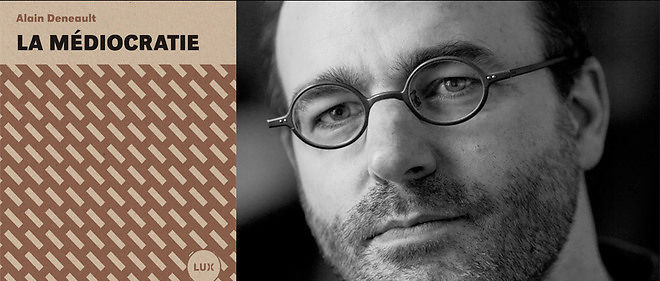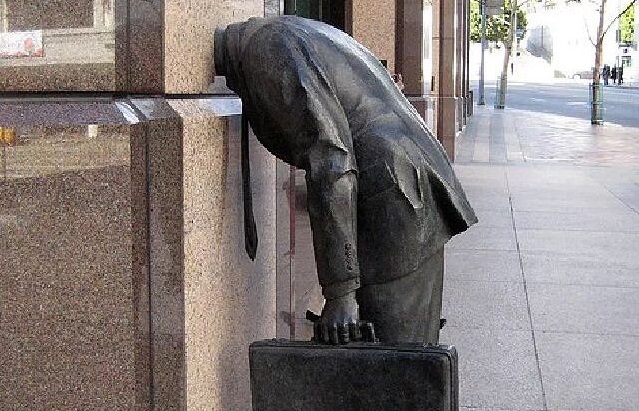An “anaesthetizing revolution” has been silently accomplished under our eyes but we have hardly noticed it: the “mediocracy” has overwhelmed us. The mediocre have entered the room of the buttons and urge us to be like them, a bit like the aliens of Don Siegel’s movie “Invasion of the Body Snatchers“. Do you remember?
“Mediocracy” is the title of the book by the Canadian philosopher Alain Deneault, professor of political science at the University of Montreal. The work (“La Mediocratie“, Lux Editeur ) has been translated into Italian by the publisher Neri Pozza, with the title “La Mediocrazia“.
Deneault says things clearly: “There was no Bastille grip – he writes at the beginning of the book -, nothing comparable to the fire of the Reichstag and the cruiser Aurora has not fired any cannon shots yet… However, the assault has already been launched and has been crowned with success: the mediocre have taken power”. But why did the mediocre take power? How did they do it? In short, how did we get to this point?
What Deneault calls the “anaesthetizing revolution” is the attitude that leads us to put ourselves at the centre, or rather at the “extreme centre”, says the Canadian philosopher. Never disturb and above all never do anything that could challenge the economic and social order. Everything must be standardized. The “media” has become the norm, “mediocrity” has been elected as a model.
Who are the mediocre
Being mediocre, explains Deneault, does not mean being incompetent. Indeed, the opposite is true. The system encourages the rise of moderately competent individuals to the detriment of super competent and incompetents. The latter for obvious reasons (they are inefficient), the former because they risk questioning the system and its conventions. But anyway, the mediocre must be an expert. It must have a useful competence that does not call into question the ideological foundations of the system. The critical spirit must be limited and restricted within specific boundaries because if it were not so it could represent a danger. The mediocre, in short, explains the Canadian philosopher, must “play the game”.
Play the game

What does this mean? Playing the game means accepting informal behaviour, small compromises that serve to achieve short-term goals, means submitting to unspoken rules, often closing your eyes. Playing the game, says Deneault, means agreeing not to mention a specific name in a relationship, to be generic about a specific aspect, not to mention others. Ultimately, it is about implementing behaviours that are not mandatory but that mark a relationship of loyalty to someone or to a network or a specific consortium.
It is in this way that informal relationships are welded together, providing proof of being “reliable”, of always placing oneself on that median line that does not generate destabilizing risks. “Bending obediently to the rules established for the sole purpose of positioning on the social chessboard” is the goal of mediocre.
One would say that the main characteristic of mediocrity is conformism, a little like for the petty bourgeois Marcello Clerici, the protagonist of the novel by Alberto Moravia, “Il Conformista“.
Behaviours that serve to underline the belonging to a context that leaves to the strongest a great decision-making power. At the end of the day, these are attitudes that tend to generate corrupt institutions. And corruption reaches its climax when individuals who practice it no longer realize they are.
The ills of politics
At the origin of mediocrity, there is – according to Deneault – the very death of politics, replaced by “governance”. A success built by Margaret Thatcher in the 80s and developed gradually in the following years until today. In a system characterized by governance – says the author of the book – political action is reduced to management, to what is called in the management manuals “problem solving”. That is, looking for an immediate solution to an immediate problem, which excludes any long-term reflection based on principles and a political vision that is discussed and shared publicly. In a governance regime, we are reduced to small obedient observers, chained to an identical vision of the world with a single perspective, that of liberalism.
Governance – supports Deneault – is a form of neo-liberal state management, characterized by deregulation, privatization of public services and the adaptation of the needs of companies institutions. From politics, we have slipped towards a system (that of governance ) that we tend to confuse with democracy.
Also, the terminology changes: the patients of a hospital are no longer called patients, the readers of a library are no longer readers. All became “customers”, all are consumers.
So it is not surprising that the centre dominates political thought. The differences between candidates for an elected office tend to disappear, even if they are apparently trying to differentiate them. Even the semantics is bent to mediocrity: balanced measures, right measures, compromise. This is what Denault defines with a grammatical equilibrium “the extreme centre”. The extreme centre does not correspond to the middle point on the right-left axis but coincides with the disappearance of that axis for the benefit of a single approach and a single logic.
What to do?
Mediocrity makes mediocre, explains Denault. One more reason to stop this perverse circle. It is not easy, the Canadian philosopher admits. And he cites Robert Musil , author of “the man without qualities”: “If from the inside the stupidity did not resemble so much to the talent, to the point to be exchanged with it, if from the outside it could not appear as progress, genius, hope or improvement, nobody wants to be stupid and stupidity would not exist “.
Without disturbing Musil, Philip Klass ‘s science fiction story “Null-P” comes to mind, published in 1951 under the pseudonym William Tenn. In a world destroyed by nuclear conflicts, an individual whose parameters correspond exactly to the population average, George Abnego, is welcomed as a prophet: he is the perfect average man. Abnego is elected president of the United States and after him his descendants, who become the leaders of the whole world. With time, men become more and more standardized. The homo abnegus, named after George Abnego, replaces homo sapiens. Humanity regresses technologically until, after a quarter of a million years, men end up being tamed by an evolved species of dogs that employ them in their favourite sport: the recovery of sticks and objects. Reporting men are born.
Science fiction, of course. But to avoid a future that we would gladly do without, Deneault indicates a road that starts with small daily steps: resisting the small temptations and saying no. I will not take that function, I will not accept that promotion, I will refuse that gesture of gratitude so as not to make me slowly poison. Resisting to get out of mediocrity is certainly not simple. But perhaps it is worth trying.
The original story in Italian has been published here: La “mediocrazia” ci ha travolti, così i mediocri hanno preso il potere
L’URLO is also on Facebook and on Flipboard
Twitter: @Angelo_Mincuzzi
angelo.mincuzzi@ilsole24ore.com



